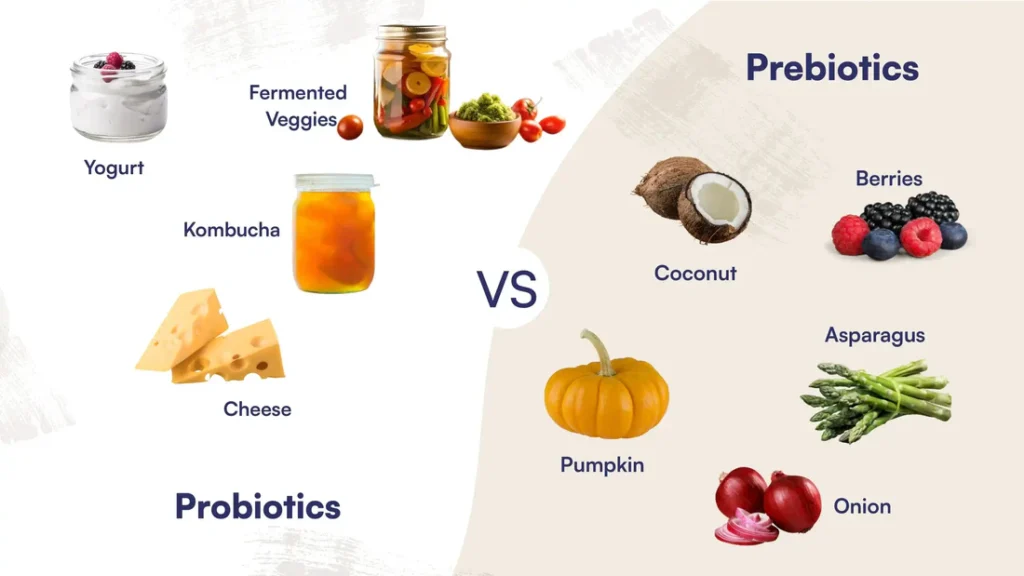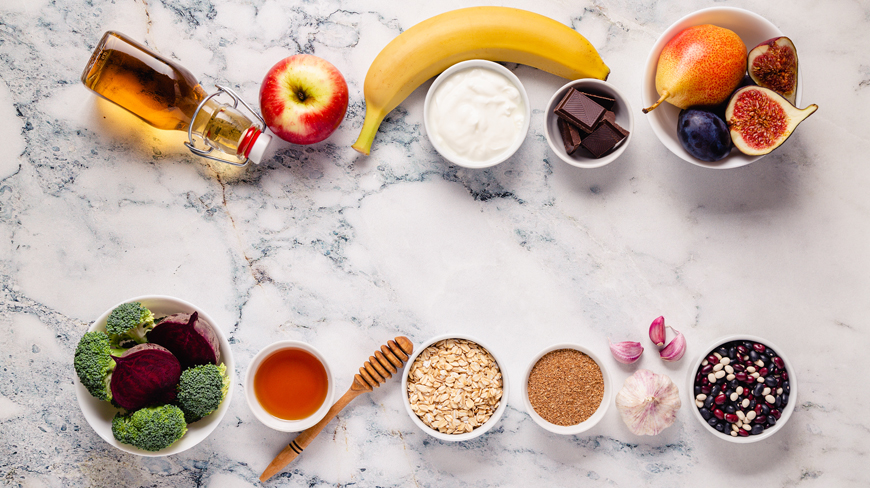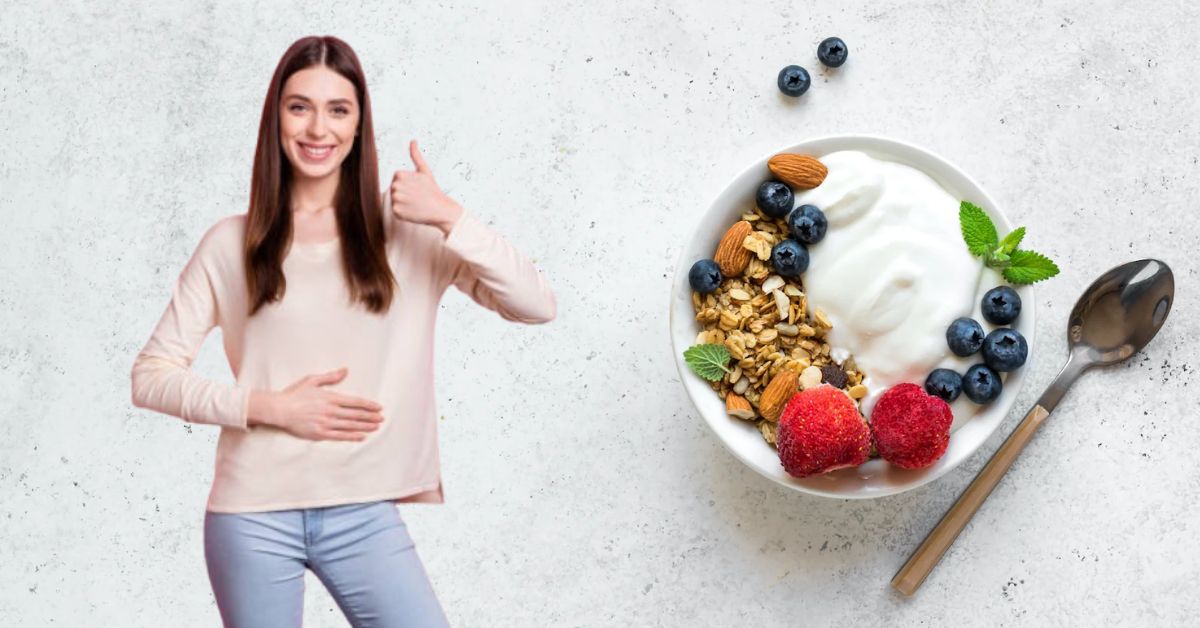Maintaining a healthy gut is one of the best things you can do for your overall well-being. The digestive system isn’t just about breaking down food it’s a powerhouse of immune function, nutrient absorption, hormone regulation, and even mood stability. In recent years, gut health has moved to the forefront of wellness discussions, and for good reason. An imbalance in gut bacteria can lead to digestive discomfort, weakened immunity, low energy, and a higher risk of chronic disease.
The good news? You can improve your gut health naturally by incorporating the right foods into your diet. Certain foods feed the “good” bacteria, improve digestion, and reduce inflammation, helping your gut work at its best.
This article is your complete guide to the best gut health foods for a happy digestive system covering everything from probiotics and prebiotics to high-fibre choices, fermented favourites, and herbal allies.
1. Why Gut Health Matters?
Your gut is home to trillions of microorganisms, collectively known as the gut microbiome. These microbes play vital roles in:
- Breaking down complex foods
- Producing vitamins like B12 and K
- Supporting immune defences
- Maintaining a healthy metabolism
- Regulating mood through the gut-brain axis
When your gut microbiome is balanced, you feel energised, digest food well, and have fewer health issues. When it’s out of balance often due to poor diet, stress, or antibiotics you may experience bloating, constipation, diarrhoea, skin issues, or even anxiety and brain fog.
The secret to a thriving microbiome lies in feeding the beneficial bacteria and reducing foods that promote harmful microbes.
2. Understanding Probiotics and Prebiotics
Before we dive into the list of best gut health foods, it’s important to understand two essential terms:
Probiotics
These are live, beneficial bacteria that directly add to the population of healthy microbes in your gut. They are found in fermented foods like yogurt, kefir, kimchi, sauerkraut, and miso.
Prebiotics
These are types of dietary fibre that feed the good bacteria already present in your gut. Prebiotic-rich foods include onions, garlic, bananas, asparagus, and oats.
The golden rule for gut health: A combination of probiotics and prebiotics is key probiotics introduce good bacteria, while prebiotics help them thrive.
Here’s the ultimate list of gut-friendly foods, broken down into categories for easy reference.
A. Fermented Foods Natural Probiotics
Fermented foods have been part of human diets for thousands of years, not only for their unique flavours but also for their incredible health benefits. They are produced through a process called fermentation, where natural bacteria, yeast, or fungi break down sugars and starches into acids, gases, or alcohol. This process not only preserves the food but also produces probiotics live, beneficial microorganisms that help maintain a balanced gut microbiome.
Including fermented foods in your daily diet can improve digestion, enhance nutrient absorption, and strengthen immunity. These foods replenish healthy bacteria in the digestive tract, making them essential for a happy and healthy digestive system.
1. Yogurt
Yogurt is one of the most popular probiotic-rich foods, made by fermenting milk with beneficial bacteria such as Lactobacillus and Bifidobacterium. Regular consumption supports digestion, may reduce bloating, and can even alleviate symptoms of Irritable Bowel Syndrome (IBS). To maximise gut health benefits, always choose unsweetened, plain yogurt without artificial additives. Greek yogurt is a great choice for those looking for extra protein alongside probiotics.
2. Kefir
Kefir is a fermented milk drink similar to yogurt but thinner in consistency and richer in probiotic diversity. It contains more strains of bacteria and yeast, making it an even more potent digestive ally. Kefir is particularly helpful for improving lactose digestion in people who are lactose intolerant. It also supports the immune system and can be made from dairy or plant-based milks such as almond, coconut, or soy.
3. Sauerkraut
Sauerkraut, made from fermented cabbage, is a traditional European food that is loaded with probiotics and vitamin C. It aids digestion by introducing healthy bacteria into the gut and supports immune function through its antioxidant content. For maximum benefits, opt for raw, unpasteurised sauerkraut, as heat treatment can destroy the beneficial bacteria.
4. Kimchi
Kimchi is a staple in Korean cuisine, typically made from fermented cabbage, radish, and spices. It is rich in probiotics, vitamins A, B, and C, and powerful antioxidants. Studies suggest kimchi may have anti-inflammatory properties and help improve cholesterol levels. Its spicy flavour also makes it a versatile addition to meals, adding both taste and health benefits.
5. Miso
Miso is a traditional Japanese fermented paste made from soybeans, salt, and a starter culture called koji. It’s packed with minerals, amino acids, and probiotics that contribute to gut health. Miso adds a deep, savoury flavour (umami) to soups, sauces, and marinades. To preserve the probiotics, miso should be added to warm, not boiling, liquids.
6. Tempeh
Tempeh is a fermented soybean product with a firm, nutty texture. It is high in protein, making it a favourite for vegetarians and vegans. The fermentation process reduces anti-nutrients in soy, making its minerals easier for the body to absorb. Tempeh contains both probiotics and prebiotic fibre, creating a double benefit for gut health.
Why Fermented Foods Are Gut Health Superstars
Fermented foods are more than just trendy wellness items they are functional foods that restore gut balance, boost immunity, and improve digestion naturally. Regularly including yogurt, kefir, sauerkraut, kimchi, miso, and tempeh in your diet is one of the simplest and most effective ways to keep your digestive system thriving.
B. Prebiotic-Rich Foods Fuel for Good Bacteria

When it comes to gut health, probiotics often get all the attention. However, feeding the beneficial bacteria already living in your digestive system is equally important. This is where prebiotics come in.
Prebiotics are a type of dietary fibre that your body can’t digest but your gut bacteria can. Think of them as fertiliser for your microbiome they provide the nourishment your friendly bacteria need to grow, multiply, and carry out their beneficial functions. By regularly eating prebiotic-rich foods, you help maintain a diverse and healthy gut environment, which supports better digestion, immunity, and nutrient absorption.
Here are six of the best prebiotic-rich foods to include in your diet.
1. Garlic
Garlic is a culinary favourite with powerful gut health benefits. It contains inulin, one of the most effective prebiotic fibres, which stimulates the growth of beneficial bacteria such as Bifidobacteria. Garlic also has natural antimicrobial properties, which help maintain a balanced gut microbiome by discouraging the overgrowth of harmful bacteria. Adding raw or lightly cooked garlic to meals not only boosts flavour but also supports both gut health and immune function.
2. Onions
Onions are another versatile kitchen staple rich in inulin and fructooligosaccharides (FOS). These compounds feed good bacteria in the large intestine and promote the production of short-chain fatty acids (SCFAs), which support colon health and reduce inflammation. Onions can be enjoyed raw in salads, caramelised for sweetness, or cooked into soups and stews for a gut-friendly flavour boost.
3. Asparagus
Asparagus is high in inulin and low in calories, making it a great prebiotic choice for a healthy digestive system. The fibre in asparagus supports beneficial bacteria growth while also aiding regular bowel movements. In addition to its gut benefits, asparagus is rich in antioxidants and essential vitamins, contributing to overall health. Lightly steaming or roasting asparagus helps retain its nutrients while making it more palatable.
4. Bananas
Bananas are one of the easiest ways to add prebiotic fibre to your diet. They contain resistant starch (especially when slightly underripe), which acts as food for good bacteria. Bananas are also gentle on the digestive system, making them ideal for those recovering from stomach upset. Eating them regularly can help maintain bowel regularity and support a balanced gut environment.
5. Oats
Oats are a fantastic source of beta-glucan and resistant starch, both of which promote healthy gut bacteria. Beta-glucan also helps improve satiety and regulate blood sugar levels, making oats a great breakfast choice. Enjoying a bowl of oatmeal, overnight oats, or oat-based smoothies can give your microbiome the daily nourishment it needs.
6. Apples
Apples are rich in pectin, a prebiotic fibre that supports the growth of beneficial bacteria and helps regulate digestion. Pectin also has anti-inflammatory effects in the gut and contributes to improved stool consistency. Eating apples with the skin on provides even more fibre, so opt for fresh, whole apples over processed apple products for the best gut health benefits.
Why Prebiotics Are Essential for Gut Balance
While probiotics add new strains of beneficial bacteria to your gut, prebiotics keep them well-fed and thriving. A diet that includes both often called a synbiotic approach can dramatically improve digestion, boost immunity, and maintain long-term gut balance.
C. High-Fibre Foods For Regularity and Microbiome Support
Dietary fibre plays a crucial role in maintaining a healthy gut and promoting smooth digestion. It adds bulk to stools, helps prevent constipation, and provides nourishment for beneficial gut bacteria. A fibre-rich diet also supports balanced blood sugar levels, weight management, and long-term heart health. For optimal gut function, aim for a variety of both soluble and insoluble fibre sources in your daily meals.
Here are some of the best high-fibre foods to keep your digestive system in top shape.
1. Lentils
Lentils are a powerhouse of nutrition, offering both soluble and insoluble fibre along with plant-based protein. They help promote regular bowel movements, feed good bacteria, and keep you feeling full for longer. Lentils are also rich in minerals like iron, magnesium, and potassium, making them a wholesome choice for gut and overall health.
2. Chickpeas
Chickpeas are rich in soluble fibre, which helps slow digestion, regulate blood sugar, and support the growth of healthy gut bacteria. They also provide plant-based protein and essential nutrients such as folate and manganese. Whether roasted, blended into hummus, or added to salads, chickpeas are an easy way to boost fibre intake.
3. Flaxseeds
Flaxseeds are packed with soluble fibre and omega-3 fatty acids, which work together to improve bowel regularity and reduce inflammation in the gut. Ground flaxseeds are easier to digest and can be added to smoothies, oatmeal, or baked goods for a simple fibre boost.
4. Chia Seeds
Chia seeds absorb water to form a gel-like substance in the stomach, which helps soften stools and promote regularity. They are also rich in antioxidants, protein, and omega-3s, supporting overall health while keeping your gut in balance.
D. Polyphenol-Rich Foods Anti-Inflammatory Gut Support
Polyphenols are naturally occurring plant compounds known for their powerful antioxidant and anti-inflammatory effects. They not only protect cells from oxidative stress but also serve as nourishment for beneficial gut bacteria, helping to maintain a diverse and balanced microbiome. Regular consumption of polyphenol-rich foods can improve digestion, reduce inflammation, and support overall health.
1. Green Tea
Green tea is rich in catechins, a type of polyphenol that promotes the growth of beneficial bacteria while inhibiting harmful strains. It also supports metabolism and may help reduce inflammation in the digestive tract. Drinking green tea daily can give your gut a gentle but effective health boost.
2. Berries
Berries such as blueberries, raspberries, and strawberries are loaded with polyphenols that feed good bacteria and enhance gut microbial diversity. They also contain fibre, which works alongside polyphenols to support digestive health.
3. Dark Chocolate
High-quality dark chocolate (70% cocoa or higher) is packed with flavonoids that encourage the growth of healthy gut flora. In moderation, it offers both a delicious treat and a natural gut health enhancer.
Foods to Limit for Gut Health

While adding gut-friendly foods is crucial, you should also limit:
- Refined sugars Feed harmful bacteria and yeast
- Artificial sweeteners May disrupt microbiome balance
- Highly processed foods Low in fibre, high in additives
- Excessive alcohol Damages gut lining and reduces beneficial bacteria
Tips for a Gut-Healthy Diet
- Include a variety of probiotic and prebiotic foods daily
- Stay hydrated to help fibre do its job
- Reduce stress, as it can negatively impact the gut
- Get enough sleep for microbiome balance
- Exercise regularly to support digestion
Sample Gut-Health Meal Plan
| Meal | Food | Gut Health Benefit |
|---|---|---|
| Breakfast | Overnight oats with banana, chia seeds, and yogurt | Fibre + probiotics |
| Snack | Apple with almond butter | Prebiotics + healthy fats |
| Lunch | Lentil salad with asparagus and sauerkraut | Fibre + probiotics |
| Snack | Green tea with a square of dark chocolate | Polyphenols |
| Dinner | Grilled salmon with garlic-roasted vegetables and kimchi | Anti-inflammatory + probiotics |
FAQs:
1. What are the best foods to improve gut health quickly?
Foods like yogurt, kefir, sauerkraut, garlic, oats, and berries are excellent for gut health. They provide probiotics, prebiotics, fibre, and antioxidants to restore balance and support digestion.
2. How often should I eat probiotic-rich foods?
For optimal gut health, aim to include probiotic-rich foods like yogurt, kimchi, or kefir at least 3–4 times a week. Daily intake offers even greater benefits for digestion and immunity.
3. Are prebiotics and probiotics the same?
No. Probiotics are live beneficial bacteria, while prebiotics are fibres that feed these bacteria. Both work together probiotics introduce good bacteria, and prebiotics help them thrive.
4. Can fibre improve gut health?
Yes. Fibre promotes regular bowel movements, feeds beneficial gut bacteria, and supports overall digestion. High-fibre foods like lentils, chickpeas, and chia seeds are great for a healthy microbiome.
5. Are fermented foods safe for everyone?
Most people can enjoy fermented foods, but those with certain digestive conditions like SIBO (Small Intestinal Bacterial Overgrowth) should consult a doctor before increasing intake.
6. How long does it take to notice gut health improvements?
With consistent healthy eating, some people notice digestive improvements within a few days to a few weeks, while long-term microbiome balance may take several months.
Must Read:
Final Thoughts:
A happy digestive system starts with what you put on your plate. The best gut health foods from probiotic-rich yogurt and kefir to fibre-filled lentils and antioxidant-packed berries can transform your digestion, boost immunity, and improve overall health.
By regularly incorporating these foods into your diet, you nourish the beneficial bacteria that keep your gut in balance.
